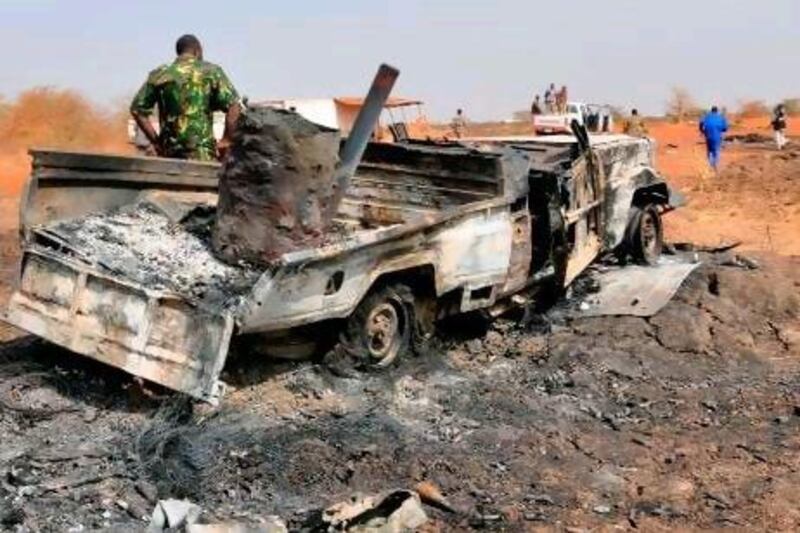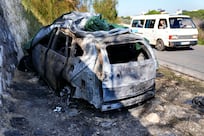JUBA // Clashes along the volatile frontier between Sudan and South Sudan have scuttled hopes that an upcoming summit would pave the way to peace and allow the cash-strapped south to resume oil production.
On Tuesday, Sudan's president, Omar Al Bashir, called off a planned visit to Juba to meet his counterpart and sign two landmark agreements hammered out after eight months of negotiations. The announcement came after both sides accused each other of striking first in a series of battles between ground troops on the frontier on Monday and Tuesday.
Fighting on the ground had reportedly ceased on both sides of the undemarcated border but dead bodies and destroyed tanks lay strewn in Heglig, an oil-rich area partly claimed by both countries. Smoke still rose from a damaged residence at the battle scene, said an AFP correspondent who saw three bodies.
The European Union and the African Union called for both sides to exercise restraint, expressing fears that the border clashes could escalate into wider conflict. Hillary Clinton, the US Secretary of State, said Khartoum bore the responsibility for the renewed hostilities.
Some analysts suggest that hardliners in both countries incited border violence to prevent the summit, and to undermine peace negotiations continuing since the end of a two-decade civil war that led to the south's secession last July.
"In Sudan, the hawks cannot bear the fact that they lost nearly 100 per cent of their oil reserves," said Jonah Leff, an analyst with the Geneva-based Small Arms Survey. "In the south there is still widespread resentment for the grievances stemming from the war."
South Sudan's government spokesman, Barnaba Marial Benjamin, told The National yesterday that his country's army had withdrawn from Sudanese territory, and that there were no new clashes or bombings. He told reporters on Tuesday that SAF (Sudan's army) was continuing to drop bombs in South Sudan's Unity state and had attacked military on the ground, prompting southern forces to pursue SAF troops into Sudan.
Officials in Khartoum downplayed the ground fighting as "minor", and denied carrying out aerial attacks. But a source speaking on condition of anonymity said the United Nations peacekeeping mission pinpointed a bomb strike about halfway between the town of Rubkona and the Unity oilfields. Unity state information minister Gideon Gatpan said bombs hit oilfields, but did not damage infrastructure.
Both countries said they would send representatives today to a previously planned forum in Addis Ababa, the Ethiopian capital, where they would discuss the border violence. But Sudan said security concerns would prevent Mr Al Bashir from travelling to the southern capital to sign agreements on citizenship and border demarcation as planned.
Pagan Amum, South Sudan's chief negotiator, told reporters on Sunday that he hoped the accords would lead to further agreements on issues outstanding, which included oil-revenue sharing, since the south declared independence on July 9.
"The cancellation of next Tuesday's presidential summit [in Juba] is a huge blow to the progress that had recently been made in the negotiations," said Dana Wilkins of Global Witness, a London-based natural resource watchdog group. "The fact that oilfields and facilities on both sides of the border were the main targets in these clashes will aggravate the already very tense discussions on a new oil deal."
South Sudan halted production in late January after accusing Sudan of "stealing" US$815-million (Dh2.99 billion) worth of its oil. Khartoum said it confiscated the oil to make up for fees owed by the landlocked south for use of an oil pipeline and processing facilities in its territory.
South Sudan acquired three quarters of the formerly united country's oil reserves when it seceded after a two-decade war. The loss of those reserves has sent Sudan's economy reeling. And with the shutdown in January, South Sudan's government has lost the source of 98 per cent of its revenue. The drastic move to cease production came after months of negotiations that failed to yield agreements on oil, disputed border areas, and the fate of each country's citizens who now reside on either side of an international border.
The agreements were the first major achievements of the talks, and the planned meeting between Mr Al Bashir and Mr Kiir was considered symbolic of a new spirit of cooperation. One accord would have granted freedoms such as land ownership and the right to work for hundreds of thousands of citizens of both countries on either side of the border; the other required the establishment of a joint committee and technical team to demarcate their ill-defined border.
Mr Leff, of Small Arms Survey, said some in Khartoum probably oppose the demarcation process as it could result in the loss of what they consider Sudanese territory, including oil-rich border regions.
"The desire to capture the disputed territory is not only out of economic interest, but holds symbolic significance for both sides, particularly the north," he said.
foreign.desk@thenational.ae





